 |
Home | Search | Browse | About IPO | Staff | Links |
 |
Home | Search | Browse | About IPO | Staff | Links |
|
THE CHICAGO MACHINE
'Baby, what's happening?' 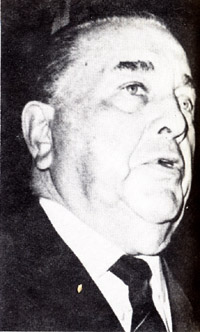
The relations between the gears and goals of the Chicago Machine and that vast complex, often arcane body of thought called political theory, were dissected and examined by Louis Masotti and Milton Rakove during "Crossroads 80, " the conference on Illinois government and politics at Sangamon State University in Springfield, October 2-4. The probes go deep at times. Is Mayor Jane Byrne now a prisoner? Both Masotti and Rakove see Richard M. Daley as the up and coming power, though they disagree on his ambitions. Read these edited transcripts of Masotti and Rakove, and note their discussion took place prior to the November 4 election. Milton Rakove is professor of political science at the University of Chicago and his books include, Don't Make No Waves . . . Don't Back No Losers and We Don't Want Nobody Nobody Sent. He also writes on Chicago politics for Illinois Issues. Louis Masotti is professor of political science at Northwestern University and has just stepped down as director of the Center for Urban Affairs at Northwestern. He is currently completing a new book on "Chicago after Daley. "Masotti is also a board member of Illinois Issues, which was co-sponsor of Crossroads 80 with the Legislative Studies Center and Center for Political Studies and Program Evaluation, both at Sangamon State; the University of Illinois Institute of Government & Public Affairs; and the Illinois Political Science Association. 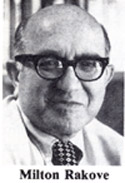
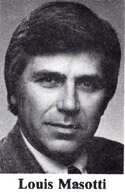
The Machine always adapted; and under Daley, there was stability MILTON RAKOVE: CHICAGO may be the second city in the country, but politically it is the first city in the world. There is no city in the world where they play politics better than they do in Chicago. A long time ago I made up my mind that if I could understand Richard J. Daley, Bernie Neistein, Vito Marzullo and Tom Keane, I could understand Mao Tsetung, Brezhnev, anybody. Because these Chicagoans are classic politicians and Chicago has a classic political process. If you want to understand the Machine in Chicago, you first have to understand that it is not just a political machine nor just the Daley Machine. The Machine was there for a quarter of a century before Daley came in. It was founded in 1931 and Daley took it over in 1955; so it is not the Daley Machine. It was at its best under Daley, but it has survived Daley. It may even survive Jane Byrne (laughter).
The Machine always had an incredible ability to adapt to changing conditions in the city. This is one of the reasons it has survived so long. Mike Royko says the Machine survived because in other cities the machines reformed, but in Chicago they never reformed and they survived. But that's too simple. The Machine adapted. It adapted to tremendous changes in the city: to the cultural changes, to the great racial migration of blacks ethnics, and Latinos to the city. If you know the history of the Machine, you know it was built on the ethnic principle. A machine built on ethnic wards and ethnic politicians. But the city is no longer a city of ethnic wards or ethnic neighborhoods. Chicago is now a city of great racial areas — black areas, brown areas and white areas. Some of the power has passed from the ethnics to the blacks but is now passing back to the ethnics. As the black population has grown, lately black political power has been declining. And there is no Latin power in the city. 14/February 1981 /Illinois Issues 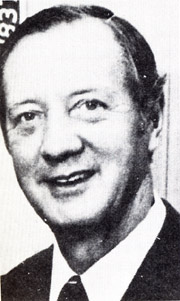
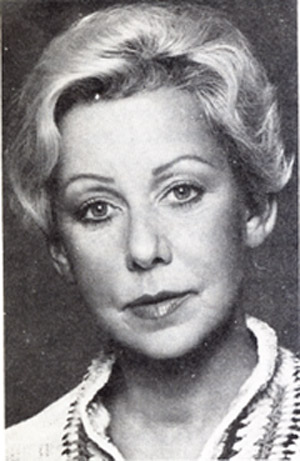
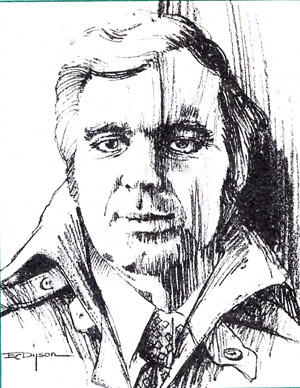
At left, of course, is the late Richard J. Daley, mayor of Chicago and its powerful Democratic Machine for 21 years. Michael A. Bilandic served the interregnum between Daley and Jane Byrne, elected mayor in 1979. The next Chicago mayoral election is in 1983, when many predict newly elected Cook County State's Atty. Richard M. Daley, may oppose Byrne. Nobody knows how many Latins there are in Chicago. The census for 1970 said there are 250,000; there may be 250,000 Mexicans on 18th Street alone. They don't have any power. You know why they don't have any power? They don't vote. If you don't vote, you don't count. Black power is also declining, because they are not registering and they are not voting. And if you don't vote in Chicago you don't count. The Machine is a highly decentralized operation, which is one of its great strengths. A lot of people really don't understand this characteristic of the Machine. They always believed it was some kind of dictatorship run by Daley. It was never a dictatorship. It was a highly decentralized operation built on the principle that if you get a piece of the action, you take care of the action. You stand or fall on how well you do on your piece of the action. If the Machine wins in an election and you lose in your ward, you lost. If they lose in the election, and you carry your ward, you won. Thirdly, the Machine was insistent that its interest came first. The whole was greater than the sum of any of its parts. You could have secondary interests if you were a part of the Machine, but you always had to subordinate those interests to those interests of the Machine. You could be a good Catholic, if you wanted, but the Machine came first. If the pope wanted you and Daley wanted you, you better go with Daley. The pope would get you later; Daley would get you now. Loyalty came first; you came second. If you ever forgot that, they would let you know. Finally, one of the great strengths of the Machine was the fact that these guys understood where they had power and where they could get in trouble. The Machine concentrated on local power. Chicago is the ball game. Springfield doesn't count. They sent guys to Springfield for training and then brought them back to play in the big leagues: to be an alderman, or a ward committeeman or a county commissioner. You go down to the Capitol for punishment and to serve your term, or you could be sent to Washington for experience. Control of the local environment comes first. Those were the basic principles of the Machine long before Daley took it over.
Daley shifted shifted the focus of the Machine and altered its power balance. Daley took the city government away from the politicians. Daley hired a professional bureaucracy to run the city, and he downgraded the role of the politicians. That is Daley's major contribution to the Machine. He did other things but that was the most important. Daley was an incredible politician and he was also a superb administrator. Good politicians make mediocre administrators and good administrators are bad politicians. Good politicians run around to chicken dinners all the time. They shake hands with everybody that they see standing on street corners. They shake hands with doorknobs to stay in practice. Good administrators don't shake hands or go to chicken dinners. They run the place. As mayor, Daley had to run the city; as party chairman, he had to win elections. He tied that whole package up together. He also created a working relationship with the private interest groups within the community: the bankers, the businessmen, the labor unions, the ethnic groups. Under Daley there was a very sophisticated political/governmental/private interest group system in which the informal dynamics were more important than the formal processes of the system. You knew where to go and people knew what to do. Everyone had a handshake relationship; their word was good. There may not have been social progress. Daley wasn't interested in that. But there was stability in the city. February 1981/Illinois Issues/15
Chicago politics under Byrne —
Make Waves and Back Losers LOUIS MASOTTI: ON February 27, 1979, Jane Byrne was nominated to be mayor of Chicago. Nothing has been the same since. Within a week I became executive director of the Transition Committee. Little did I know at the time what we were transiting to. It has been a remarkable year-and-a-half. Almost everything that Milt has just described as the way things were under Daley, and indeed under many of his predecessors, is no longer true. There are those who will argue that under Byrne, or the Byrne/McMullen administration, that Jane has taken pages from the Daley book. I would argue that she has taken some pages from the Daley book. She has ignored entire chapters and she has rewritten and edited a great deal of the rest of the Daley book. Indeed, Milt, if you can come up with another good title you've got to write another book about Chicago politics circa 1990. I don't think things are going to be the same in 1990 as they were in 1975 when you wrote Don't Make No Waves . . . Don't Back No Losers. In fact you could change the title to: Make Waves and Back Losers! Who would have thought that in Chicago we would have Byrne, Daley and Carey fighting among themselves over the control of a major county office? Who could have imagined that Senator Netsch and Alderman Ober-man would be supporting somebody named Richard Daley, at the same time that somebody named Dick Simpson and the alderman who succeeded Len Despres, in the fifth ward (Bloom), would be on the other side. The independents are split; the Irish are split; the Machine is split. And all of this has happened in about 18 months. Not all of what has happened is the result of Mrs. Byrne's ascension to power; some of these things would have happened if Bilandic had been elected. Let me say a few words about the interregnum of Michael Bilandic. Following the death of the mayor there was a very short struggle for succession because Mayor Daley had not provided for succession, although I think had he designed it, it would have looked pretty much the same. I don't think Daley would have any problems with Bilandic having become mayor. Indeed for a period of two years, Mike Bilandic "held the fort," which was precisely what was required at the time. It provided stability and continuity until the organization could get its act together and decide how to proceed. What they decided to do was to stick with Bilandic. Everybody liked the arrangement. Labor liked it. Business liked it. Mike was a very good administrator. People question his political acumen. In fact, if he had political acumen he would still be mayor rather than practicing law. But Bilandic didn't deal with the politics of snow or the politics of mass transit in the winter of our discontent and he was defeated. Not by much, however. He lost to a coalition of independents, blacks, Republicans and dissident regulars by about 17,000 votes. That coalition, by the way, and this I think is quite significant, has not been capitalized on by the incumbent mayor. I don't think the majority of the people who voted for her in 1979 would vote for her today. The blacks certainly don't support Mrs. Byrne today in any real sense, except for some professional politicians who fear the mayor's wrath. 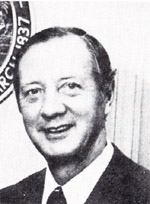
The independents do not support her. It was very interesting to hear that Alderman Bloom and former Alderman Simpson are supporting Carey in his race against Richie Daley for state's attorney. They indicated that in supporting him they were not supporting Byrne. A very careful distinction. Jane Byrne has argued, and will continue to argue, that she is not opposed to the Machine and in fact was a part of it. She was a student of the Machine and a protegee of Mayor Daley's. But she wanted to get rid of Bilandic; her election was in part the result of her vendetta against him. It must be remembered that she did not win the election. Bilandic lost it. What has happened in Chicago is that we have moved from what Milt Rakove has described as a stable, predictable situation to one that is highly unstable and highly unpredictable. It is hard to know what will happen from day to day. The only time it's quiet is when the mayor is traveling overseas — which seems to be quite a bit these days. There just doesn't seem to be a plan for the Byrne administration, although one was offered by the transition committee. If you had to identify some of the differences between the Daley administration and the Byrne administration, the key differences would be that the process is uncertain, the policies are not identifiable, and the players change very rapidly. The so-called "revolving door approach" to cit,v administration was reinforced this week when two long-time professional administrators were summarily dismissed, fired or retired, depending on which edition of the paper you read and whose version you believe. These were the kind of professionals that Milt identified as, having been brought in to run complex programs by Mayor Daley. 16/February 1981 /Illinois Issues Byrne announced when she was nominated — and this was the charge to the transition committee — that she wanted to find the best and the brightest public administrators in the U.S. to run the city of Chicago. That commitment lasted about two weeks before all the backsliding began. It is almost possible to say, without being unfair, that no one appointed by Mayor Byrne to hold a major public office in her cabinet is better than anyone who held any of those offices under the Daley/Bilandic administration. Jane Byrne has also introduced stylistic differences into the politics of Chicago. Daley was kind of dull, but Mrs. Byrne is flamboyant. She gives the press a great deal to do — more than they would like at times. She is dramatic and in some ways superficial. Chicago has now become a city of "bread and circuses." Many call Chicago the second city; other people have argued that it is now a "fest-ering" city. We have Chicagofest, Springfest, Fallfest, Octoberfest and Winterfest. There are many things for people to do. We are going to have a Grand Prix in Grant Park next July 4th, which is going to be a first. It is not universally applauded but we are going to have it nonetheless. [It has since been cancelled by the mayor.] We may have a gambling casino in Chicago, which will add a certain kind of flare. But one wonders whether this is really what good government and good administration is all about. It may be good politics since Jane Byrne is attempting to portray herself as a populist. But it is not clear what fests, road races, marathons and casinos have to do with governance and the provision of good public service for the people of Chicago. Mayor Byrne plays the press like a piano. One could argue with the substance of her comments to the press, but there is no doubt about her ability to handle herself very effectively in front of the press. Substantively, the major concerns are primarily economic. Chicago is in bad shape financially — not as bad as some people think but a lot worse than most of us would like. There is a cover story in a recent Chicago magazine that implies that Chicago is another New York. Clearly it isn't, although there are some very serious problems, among which is an economic development commission that is not improving the industrial tax base. She campaigned on a platform of neighborhood revitalization but has spent all her time and the government's money on downtown revitalization. This, incidently, is a page out of the Daley book. Richard J. Daley was largely responsible for building downtown Chicago and its immediate environment. Jane came in and said she was going to rebuild the neighborhoods. But very little rebuilding has gone on despite the availability of federal dollars. There is no overall policy plan. Her system is reactive, whereas Daley, while he had no serious concern for social justice, per se, had a policy plan. It was essentially a brick and mortar plan, but it was a plan. Interestingly enough, the two major issues that Byrne has capitalized on are the two which she had said she was opposed to. One was Chicagofest — because it was Bilandic's plan. The other is the North Loop redevelopment project — which she also opposed because it was a Bilandic plan. Now it is the single most significant redevelopment project in the City of Chicago. 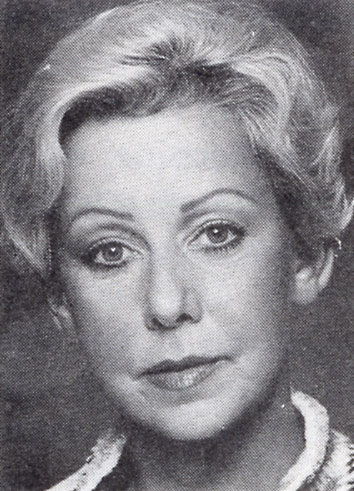
If there is one thing that characterized the Chicago Machine under Daley, it was control of the process. I think it is quite clear at this stage that that process is out of control. At this point Mayor Byrne governs by virtue of the fact that she is the mayor and thus has a significant amount of clout. Rather than govern through professional administrators, she has begun, in effect, to trade off pieces of the city in exchange for outside professional assistance from consultants. Hay Associates are making and implementing personnel policy. Peat Marwick and Ed Yeo have taken over accounting and budgeting. She is using consulting firms, although vigorously opposed to them in her campaign, to provide the professionalism that used to be an inherent part of the system. It has now moved outside of the system. Using consultants allows her to do two things. It gives her control; she either hires them or doesn't. She can blame consultants when things go wrong, or take credit when they go right. Mrs. Byrne has trouble accepting responsibility for her actions and so she needs scapegoats. Daley didn't do that. At least he didn't do it very often, and when he did, it was within the family, behind closed doors. Chicago has become an arena of open conflict. There has always been conflict. But people didn't get fired in the newspapers and we didn't have government by press release. Things have changed dramatically. If the Machine came first under the Daley administration, it has been replaced by allegiance to the mayor and not to the organization. Today, nothing is predictable — except that things will change. Milt said that the Machine under Daley adapted to change. It is not clear that Mrs. Byrne understands the changes that are happening well enough to adapt to them, or whether whatever adaptation there is, is under her control. February 1981/Illinois Issues/17 The demography of the city is changing. Milt said there are 250,000 Mexicans on 18th Street. Well, there are probably a million Latinos in Chicago and while they may not vote in large numbers and therefore don't count politically, they do consume services, and they need to be listened to. People continue to move out of the city despite the fact that Sunday supplements tell us the city is revitalizing and regentrifying. But the net effect is that there are going to be fewer people in Chicago in the 1980 census than there were in 1970 and there will be fewer still in 1990. I think I would argue that no matter who was elected in 1979, other than Michael Bilandic, major change could not have been forestalled for Jong. The Machine as we have known it under Daley would have changed. It is in the very nature of what's happening to cities, what's happening to the political system, and what is happening to relationships between cities and the federal government that these things would have changed. It is important to understand that. Jane Byrne can take some of the credit and some of the responsibility for whatever has been happening in Chicago. But the point is that it would have happened, regardless of who was mayor. It might have happened in a less dramatic fashion, but it would have happened nonetheless. I think it is incumbent upon us to try to get beyond the mayor's personality and beyond the headlines and try to understand what has happened to what, for a period of almost 50 years, was the most stable, the most predictable, the most productive, and some might argue the most efficient and well-run city organization in the United State. Chicago politics has changed and it will never be the same again.
The Machine is not dead. It is waiting for Richie Daley MILTON RAKOVE: THE OLD Machine under Daley, which was very effective in a certain sense, created an opposing force which helped to bring that Machine down. Lou is right. The Machine is beginning to come apart. Daley never dealt with the social problems of the city. Never. And because he didn't, a new wave built up quietly in Chicago. Jane Byrne rode that wave. She didn't create it. She never understood it. Daley just couldn't come to terms with the blacks and the Latinos. Jane Byrne doesn't understand them either, although she used them. She is a prisoner of the old. She rode the wave and exploited it and led it some. She went to the streets and she aroused the blacks. She carried every black ward in Chicago against the Machine, which is phenomenal. The liberals supported her because they saw something new, but she never really dealt with their concerns. My own guess is that Byrne, like Bilandic, will be an interim figure. Byrne will be an interim figure because she is a prisoner of her own background and lacks understanding of what is really going on in the city. The key to the Machine's survival is its ability to adapt, as I said before. That process of adaptation is beginning already in Chicago. I see a new coalition developing in Chicago, a new Machine. Not the end of the Machine but a different Machine, one which is tied in with Richie Daley, Tommy Hynes, the county assessor, who is a very astute, able guy. If you look at the numbers from Richie Daley's victory in the primary, I think you will see that he is going to win against Carey in November. This race is not for state's attorney. One of Daley's great assets is Don Rose, who is running Carey's campaign, because Don Rose thinks this campaign is for state's attorney. This is not for state's attorney; it's for mayor. In the primary, Richie carried the southwest side big, did fairly well in the black wards, did fairly well in the white, liberal independent wards along the lakefront and he did fairly well in the suburbs. Where he ran poorest was on the north side where there is a countervailing power group built around Ed Kelly. I think Richie understands that you have to change, have to move. Jane Byrne opened the door in Chicago with her campaign. People expected things to be done which were never done before. She aroused expectations about the social problems of the city. Mayor Daley never dealt with these problems and never had to. He was too strong. But now they must be dealt with. Jane Byrne doesn't understand this. She went back to the old Machine and the old City Hall. On primary night I went three places. I worked for ABC that night and didn't get through until about 10:30. The first thing I did was to go over to Carter headquarters because I was elected as a Carter delegate. It was like a Republican party: you bought your own drinks and they had a band playing. Then I went to the Bismarck Hotel, Democratic party headquarters; it was like a wake, like a funeral parlor over there. And then I went to the Midland where Richie was having his party. You couldn't get in the door. There must have been three thousand people trying to get in the door. All beer drinkers, southwest side guys young Irish, Poles, Lithuanians, some Mexicans, some blacks. You could feel that they thought it was going to be their town. Richie is going to be the guy they are going to try to win it with. The coalition will come from the southwest side, the younger blacks, some more liberal young blacks especially, the liberals on the lakefront, some help from the suburbs. This new coalition could be the new Machine, adapt to changing conditions and perhaps even deal with the social problems. Richie has worked in the legislature on nursing home regulation and tax reform, and mental health issues. My own guess is he will use the state's attorney's office to get ready for 1983. So, the Machine is not dead. It is in a state of abeyance. Politicians in Chicago, like politicians everywhere, are very strange creatures. They never get too close to anybody. If he goes down they don't want to be there. They never get too far away from anyone. What if he goes up? They want to be part of that! You could see some of the politicians hedging their bets in the primary. They started to move over a little. If Richie wins, they are going to move over a lot. February 1981/Illinois Issues/18
There is no future in being the mayor of Chicago LOUIS MASOTTI: I WANT to offer an alternative hypothesis about the future. I think Richie Daley will probably win in November, but only because of the mayor's assistance. He may very well be getting ready to run for mayor in 1983, but I don't think he will. He won't be ready to run for mayor. The emerging new coalition will not be formed at that point.If Daley chooses to run in 1983, in my judgment he will lose. My own feeling is that Richie Daley would prefer to be governor of Illinois and not mayor of Chicago. There is no future in being the mayor of Chicago, while there may be a future in being governor. My own prediction at this point is that Jane Byrne is going to be elected in 1983, despite the fact that she has, in effect, no constituency. We are not moving to a "new Machine" but to a set of political interest groups within Chicago, none of which will be dominant. We are moving toward political process pluralism. Chicago is becoming more like other American cities. And what is going to happen in 1983, 1 suspect, is that there will be at least three and probably four candidates for the Democratic mayoral nomination. There will be at least one black candidate. There will be an independent candidate.There will be an endorsed party candidate, obviously. Whether Jane Byrne gets it or not, there is no question that she is going to run perhaps as an independent in the general election. And if she does not get the nomination, the party will endorse either Richie Daley or Tom Hynes. In a four candidate primary race Richie Daley is not going to be nominated — Jane Byrne is. Many in Chicago are convinced that she is a one-term mayor, but I wouldn't bet on it. February 1981/Illinois Issues/19 |
|
|